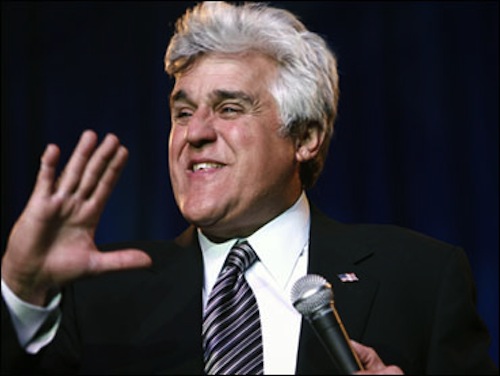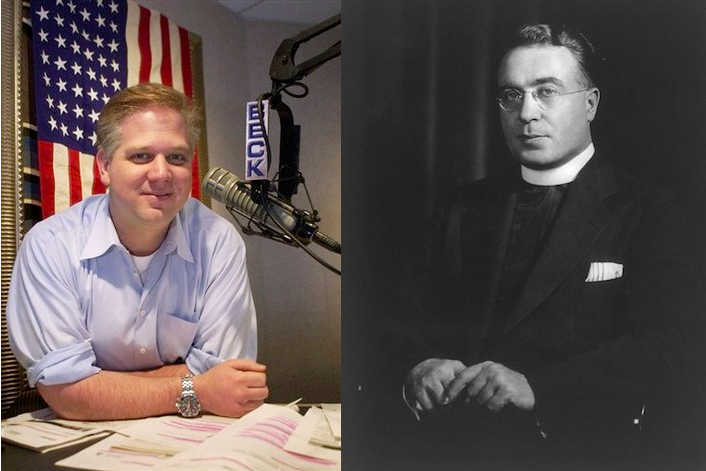Consider for a moment how much more complex our world is than the one in which our ancestors lived. The physical environment is roughly the same—albeit with abortion protestors where burning witches used to be—but our interpretation of that world is far more nuanced. Prose fiction, classical physics, the germ theory of disease, moral relativism, environmental stewardship, being cool—all these concepts overlay one another to make the modern world stand in relation to the past as an origami crane relates to a sheet of paper. It’s Friday, and the more you know the more improbable that seems. Today’s link roundup is full of fine writing and heady concepts, plus fungus. Won’t you deepen the manifold with me?
Tag Archives: socialism
Jay Leno serves Obama, nation as objective correlative

"So this chick lifts up her skirt, right, and she has the biggest—we're talking ten inches; it's amazing. And Eubanks starts puking, so we all—Jesus Christ, five minutes, I heard you the first time."
Ever since Stephen Colbert used his time at the podium to point out that George Bush was kind of a bad president, the choice of headlining comedian at the White House Correspondents Dinner has been a symbolic act. Bush—who in retrospect was not the kind of guy who has a great sense of humor about himself—chose as Colbert’s 2007 successor Rich Little. In addition to his spot-on impression of what awaits us all at the end of our lives, Little brought to the event what could only be described as maximum safety. The sheer tactical deliberateness of his selection—no one walked into that meeting saying, “You know who’s funny? Rich Little”—elevated the choice to the level of discourse. Like your favorite NBA player,*![]() your Correspondents Dinner headlining comedian says something about you. Last year, President Obama chose Wanda Sykes, who was hilarious and repeatedly threatened to say the n-word. This year, he went with Jay Leno. It wasn’t the biggest mistake of his presidency, but it was the one that sums up all the others.
your Correspondents Dinner headlining comedian says something about you. Last year, President Obama chose Wanda Sykes, who was hilarious and repeatedly threatened to say the n-word. This year, he went with Jay Leno. It wasn’t the biggest mistake of his presidency, but it was the one that sums up all the others.
Friday links! Masters and servants edition

Apparently Friedrich Nietzsche is the guest editor this week at latfh.com. Also, I'm not sure Rikki Kramp is this young man's given name.
As anyone who has read about the United States in a book will tell you, ours is a country founded on egalitarianism. Let the tottering empires of Europe labor under the notion of a permanent ruling class; America has no king, because America needs no king. Sure, certain of the exceptionally gifted among us will rise to power and prominence, and it’s only logical that those men and women keep their positions for long, illustrious careers. But even from the lofty heights of power they see us at eye level. Ours is not a culture in which a small elect view the rest of us as braying lambs, raised to numbly trot after the herd. No—we live free, with no shepherds to herd us to safety or slaughter. Or, um, maybe that’s totally how it is. Maybe the levers of American power are set hopelessly beyond the reach of any person of average heights, and we live at the mercy of forces beyond our control. Maybe the presidency really is a fifth column with its top higher than our eyes can see, and our only defense is a conglomeration of old families and wealthy industrialists trying desperately to trick us into right action before it’s too late. Both explanations—a nation of free men, a sad school play in which frightened children mumble words they dimly understand—seem equally possible. And either explanation is, after all, self-fulfilling. This week, Combat! blog presents evidence for both sides. Is America still operated by Americans? Or have we devolved into a kleptocracy in which corporate money and political aristocracy compete to see whose views they can make our own? More than most questions, this one depends on how you look at it.
Obama forces Beck to oppose volunteering
httpv://www.youtube.com/watch?v=PQVqIpqA80Y
Remember the Superman cartoon where Bizarro Superman is running wild in Metropolis and nobody can figure out how to stop him, until Superman realizes that Bizarro will automatically oppose anything Superman says or does, so all he has to do to save the city is tell Bizarro he loves him? It’s possible that was just a dream I had, or an early-childhood experience. Anyway, Glenn Beck is the Bizarro Obama. If Obama says “Merry Christmas,” Beck has to wish us all a happy Fourth of July. If Obama likes cake, Beck has to go on TV and say, “No—me hate cake so much!” while eating handfuls of broccoli. It’s a professional obligation, and as the video above shows us, it sometimes puts him in a difficult position.
The historical analog: Glenn Beck and Father Coughlin

They're both on the radio, they both love Jesus, and they're both deeply committed to cardiovascular exercise
Part of the difficulty in understanding the cultural phenomenon that is Glenn Beck—and he’s been on the cover of Time magazine, just like Arsenio Hall, so it’s official now—is pinning down exactly what he is. Despite his occasional declarations to the contrary, it seems safe to say that Beck is some kind of a Political Person. Rarely does he use his shows to give us an awesome recipe for brownies or tell us how to fix our cars; pretty much everything Glenn Beck talks about relates to the federal government of the United States. Yet where he might fit, in terms of a coherent ideology that relates to our historical moment, is infuriatingly difficult to assess. “I’m so tired of everybody having a political agenda,” he has said. “Do you know what my political agenda is? America! America!” That’s super and all, but you can’t really cite “America” as your approach to American politics, for the same reason you can’t give directions to the mall by shouting “this Subaru! this Subaru!” over and over. Beck appears to be a conservative, insofar as he is dedicated in his opposition to President Obama, but he also spends a lot of time criticizing the Republican Party. He’s deeply alarmed about both fascism and socialism, as embodied in the continued existence of the federal government; that and the general protect-your-freedom tenor of his beloved Tea Party movement suggest that he might be some kind of libertarian. But he’s also a converted Mormon, a virulent opponent of gay marriage, and a crusader against drug legalization. In general, Beck is against so much and for so little that he functions as a sort of political ghost: vaporous, impossible to pin down, yet seemingly everywhere and constantly moaning.

